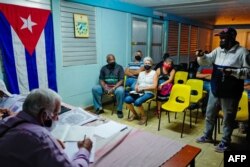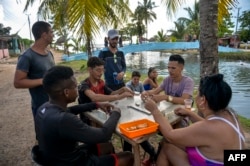With the intention of updating the Family Code that dates from 1975, the Cuban government led by Miguel Díaz-Canel advances in a crusade so that the new law is approved in a referendum scheduled for September 25.
The new Family Code, according to the official website Cuba.CU“attempts to revolutionize the concept of family. This code aims to be a portrait of Cuban society and all the communities it encompasses, defending the principles of equality and non-discrimination on the island.”
consulted by Reuters, the Cuban researcher and professor, Eberto García, said about the new norm: “The code is an exercise, first of law. Logically, it generates controversy in a highly complex context like the one we live in today in Cuba, economic, political and social complexities. Logically, a project like the code, which is registering and giving the widest possible image of what we really are, of the life models that we follow as a family and as individuals, logically has to generate tension”.
The text of the new norm has sparked a debate since last year on social networks, which is expressed in labels such as #YoDigoSi, #TodosLosDerechosParaTodasLasPersonas, #CubaInclusiva and #CódigoDeLasFamilias.
What new points does the new Family Code contain?
*Articles 56 and 57 of Title IV of the new Family Code determine that a person can have more than two filiation ties either due to original causes or due to supervening causes. In both cases, this link is legally constituted regardless of the biological link or the genetic component of the people involved.
*Stipulates the possibility that children bear the surnames of their mother and father in the order they have it.
*Article 57 clarifies that multiparenthood is legally recognized and in the case of those associated with socio-affectiveness, all pertinent factors and circumstances will be taken into account and the recognition of filiation may or may not be ordered in favor of those who have requested it without that this leads to the displacement of already established affiliations. In addition, they can claim multiparenthood, in addition to the daughter or son, the prosecution and those listed in the registration.
*Extension of the permissions of the grandparents to guarantee their communication with their grandchildren in case of any belligerence of father or mother, or to hand over the “parental responsibility” of the minors to the elderly.
This is key in a country where up to four generations live together under the same roof due to the housing deficit accumulated over decades. It also becomes important in the midst of the increase in emigration, especially of young people, who leave their minor children under the protection of their grandparents.
* Its article 50 recognizes four types of filiation and constitutive title that can be due to: natural procreation, the legal act of adoption, the use of any assisted reproduction technique and the ties that are built from judicially recognized socio-affectiveness.
*Article 51 clarifies that any of these affiliations produces the same legal effects and determines parental responsibility, surnames, the legal obligation to provide food, inheritance rights and other effects established by law.
*Provision of sanctions for domestic violence in cases of litigation for separation of property during divorce. The text that will be put to the vote legally incorporates stepmothers and stepfathers and regulates the regimes of communication with grandparents and stepfathers.
*Contemplates optional property regimes for married couples.
*Stipulates the possibility that children bear the surnames of their mother and father in the order they have it.
* Extends protection so that the disabled are not left vulnerable.
What are the changes regarding the adoption of minors?
The resource of adoption of minors is regulated in Cuba since the family code of 1975. The new law establishes changes in the field of adoptive affiliation in relation to who can request adoption.
So far, adoption is only a resource for one person, or two in the case of a marriage.
The new proposal that will go to a referendum provides that a boy or girl can be adopted by one or two people who are already married or in an affective, instrumented and registered de facto relationship.
Similarly, since marriage between people of the same gender is possible, the right of adoption is extended to them. Minors whose parents have been deprived of parental responsibility may be adopted.
The possibility of international adoption is admitted, although, for reasons of promoting the cultural identity of the nation, adoption by Cuban citizens residing in Cuba is favored over foreigners.
Why is parental authority excluded and parental responsibility is introduced?
The new law intends to understand motherhood and fatherhood as a matter of responsibility and not of possession. In this way, educating their children for development in society, so that they make their own decisions, is defined as a role. In this sense, the term parental responsibility is included to replace the old conception of parental authority.
According to the government, the elimination of the concept of parental authority “seeks to understand children and adolescents from a new dimension, more respectful of their rights and capacities.” Instead, the authorities maintain, they opt for the term parental responsibility “with the intention of reinforcing the role of fathers and mothers in the well-being of their children.”
What is expected of the referendum?
Cubans over 16 must fill out a ballot where they can only mark with a cross the words “yes” and “no” to answer the question: “Do you agree with the Family Code?”
In order for it to be adopted, it must have the “yes” of a simple majority of valid votes, according to the president of the National Electoral Council, Alina Baiseiro, reported on Thursday.
Why has the proposal been controversial?
The text was debated in neighborhoods and work centers between February and April, as part of the process for its approval.
According to the authorities, some 79,000 such meetings were held and some 6.5 million citizens participated in them. The Cuban population is approximately 11.3 million inhabitants.
The unicameral Parliament unified the criteria to announce the final text that will be voted on in September.
Some are resisting the changes, especially religious groups and churches that reject same-sex marriage, gay adoption or surrogacy.
It has also generated controversy within part of the island’s LGBT community, which criticized the fact that something they consider to be part of human rights is put to the vote.
The Family Code of 1975 stipulates that “marriage is the voluntarily arranged union of a man and a woman with legal capacity to do so, in order to live together.”
What does the Catholic Church say?
The Conference of Catholic Bishops of Cuba published in February of this year a declaration in which he opposes some aspects raised in one of the various versions of the draft, including same-sex marriage.
“We believe that our people, in the matter that concerns us, was very clear in the discussion prior to the approval of the current Constitution of 2019. It is an undeniable finding that the majority of Cubans wanted the definition of marriage to be maintained as the union of a man and a woman, as it appears in the current Family Code of 1975,” the text said.
This alludes to the reaction of Cuban religious organizations that condemned article 68 in 2019, where it was read that: “Marriage is the voluntarily arranged union between two people with legal capacity to do so, in order to live together.” As a result, the article was excluded from the Magna Carta.
The Standing Committee of the Conference assured in February that the proposal for the new Family Code “is permeated by what is known as ‘gender ideology,'” and that the forceful implantation of such an ideology would end up distorting reality.
The Conference of Catholic Bishops, in its February statement, directly rejected the rights linked to the Cuban LGBTIQ+ community.
“This perspective of gender ideology is present in the articles of the [anteproyecto] that redefine marriage, in those that speak of ‘supportive gestation’, ‘assisted filiation’ and adoption. The very introduction of the new concept of ‘parental responsibility’ and ‘progressive autonomy of the minor’, within an ideological context, creates suspicions and ambiguities that weaken the other concept that is ‘patria potestas,’” the bishops wrote.
Who will be able to participate in the referendum abroad?
The government reported that the referendum is scheduled for September 18 outside the island and only diplomats and collaborators such as doctors, technicians and specialists under official contract may participate.
Cubans residing abroad, who can only participate if they travel to the country, are excluded from this possibility.
When will the results be known?
According to the authorities, the lists of voters will be available between August 15 and 30 and the results could be announced informally the day after the vote, but they will be officially delivered to Parliament on September 30.
Connect with the Voice of America! Subscribe to our channel Youtube and turn on notifications, or follow us on social networks: Facebook, Twitter and Instagram.














![The current Family Code of Cuba has been in force since 1955. [Foto de archivo]](https://gdb.voanews.com/09680000-0a00-0242-aba5-08da7127dd11_w250_r0_s.jpg)




Add Comment